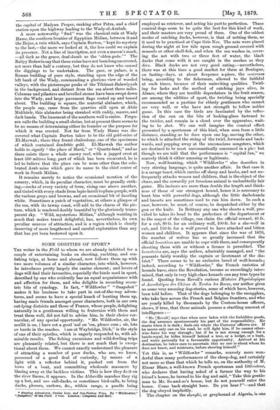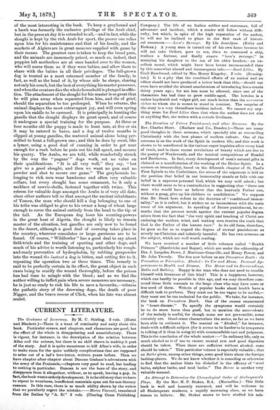SOME ODDITIES OF SPORT.*
THu writer in the Field to whom we are already indebted for a couple of entertaining books on shooting, yachting, and sea- flahing trips, at home and abroad, now follows them up with two more volumes of a similar character, into which, however, he introduces pretty largely the canine element; and lovers of dogs will find their favourites, especially the kinds used in sport, described by one who evidently has an equal acquaintance with and affection for them, and who delights in recording eccen- tric bits of cynology. In fact, " Wildfowler " " Snapshot " makes it his business to take part in out-of-the-way adven- tures, and seems to have a special knack of hunting them up, having made friends amongst queer characters, both in our own out-lying districts and those of France, whose people, delighting naturally in a gentleman willing to fraternise with them and treat them well, did not fail to advise him, in their choice ver- nacular, of any special opportunity. "Mr. Wildfowler, sir, the mullit is on, i have cot a good 'aul on 'em, pleace cum ; sir, lots ov bards in the mashes. i am at Waybridge, Dick," is the style of one of their epistles, which is eagerly responded to, with ad- mirable results. The fishing excursions and wild-fowling trips are pleasantly related, but there is not much that is excep- tional about them. We cannot exactly understand the pleasure of attracting a number of poor ducks, who are, we know, possessed of a good deal of curiosity, by means of a light with a reflector behind it, pushed out from the bows of a boat, and committing wholesale massacre by blazing away at the luckless victims. This is how they do it on the river Saone, it appears. In the Abbeville marshes they rig up a hut, and use call-ducks, or sometimes bird-calls, to bring ducks, plovers, curlews, &c., within range, a poodle being • Shooting Adventures. Canine Lore, and Sea-Fishing Trips. By 4, WIldthwler," 44,Snapehot," of the Field. 2 vols. London: Chapman and Hall.
employed as retriever, and acting his part to perfection. These comical dogs seem to be quite the best for this kind of work, and their masters are very proud of them. One of the oddest modes of catching ducks, however, is that of netting them, as it used to be practised at Cape Gris Nez. The nets were placed during the night at low tide upon rough ground covered with mussels or other shell-fish, and when the sea washes in, cover- ing the net with two or three feet of water, the black ducks that come with it are caught in the meshes as they dive. Black ducks are not very good eating,—nevertheless, there was at this time a good market for them at Boulogne, on fasting - days, at about fivepence a-piece, the macreuse being, according to the fisherman, allowed to the faithful at such times, because of their uninviting qualities. Twirl- ing for larks and the method of catching jays alive, in Alsace, where they are terrible depredators in the fruit season, are among the oddities of sport, the twirling being specially recommended as a pastime for elderly gentlemen who cannot see very well, or who have not strength to follow nobler game. In this case the birds are fascinated by the reflec- tion of the sun on the bits of looking-glass fastened to the twirler, and remain in a cloud over the apparatus, wait- ing to be shot. We can well imagine the comical effect presented by a sportsman of this kind, when seen from a little distance, standing as he does upon one leg, moving the other, to which is attached the string of the twirl, forwards and back- wards, and popping away at the unconscious songsters, which are destined to be most unromantically consumed in a pie; but though we are told that the performance is " capital fun," we scarcely think it either amusing or legitimate.
Now, wolf-hunting, which " Wildfowler " also describes in very stirring language, is quite another affair. In that case it is a savage beast, which carries off sheep and lambs, and not un- frequently attacks women and children, that is the object of the chase, and the cowardly yet ferocious animal is undoubtedly fair game. His incisors are more than double the length and thick- ness of those of our strongest hound, hence it is necessary to hunt him with powerful dogs, although the little dachshunds and bassets are sometimes used to run him down. In such a case, however, he must, of course, be despatched either by the gun or the knife. In Brittany any one who shoots a wolf, pro- vided he takes its head to the prefecture of the department or to the mayor of the village, can claim the official reward, 40 fr. for a cub, 80 fr. for an ordinary wolf, 100 fr. for a she-wolf in cub, and 150 fr. for a wolf proved to have attacked and bitten women and children. It appears that since the war of 1870, the number of wolves has so greatly increased that the official louvetiers are unable to cope with them, and consequently shooting them with or without a licence is permitted. The louveteries are, says the author, admirably managed, and " the
peasants fairly worship the captain or lieutenant of the dis- trict." There seems to be no exclusive breed of wolf-hounds ; indeed, according to " Wildfowler," the French varieties of hounds have, since the Revolution, become so exceedingly inter- mixed, that only in very high-class kennels can any true types be found. Quoting from Revoil's curious Histoire Pleysiologique et Anecclotique des Chieas de. Touter lee Races, our author gives us some very amusing dog-stories, some of which have, however, been told before. That of the dogs belonging to the smugglers, who take lace across the French and Belgian frontiers, and who are yearly killed by thousands by the Custom-house officers, shows, if true, that these animals possess a startling amount of intelligence :— "He [Revoil] says that when once laden with the forbidden goods, the dog assumes spontaneously his part of the responsibility. He starts when it is dark ; finds out where the Customs' officers are. If he meets only one on his road, he will fight him, if he cannot other- wise force his way through ; but if be is not strong enough for a battle-royal, he hides himself behind a tree, or a hedge, or a bush, and waits patiently for a favourable opportunity. Arrived at his destination, he takes care to ascertain that no one is about whom ho does not know, and mistrusts, before showing himself."
Yet this is, as " Wildfowler " remarks, scarcely more won- derful than many performances of the sheep-dog, and certainly not more so than that which he tells us, on the authority of M. Elzear Blaze, a well-known French sportsman and littgratetvr, who declares that having asked of a farmer the way to his friend's house, he turned to his dog and said, " Take this gentle- man to Mr. So-and-so's house, but do not yourself enter the house. Come back straight here. Do you hear ?"—and that
the dog obeyed implicitly. The chapter on the sloaghi, or greyhound of Algeria, is one
of the most interesting in the book. To keep a greyhound and a hawk was formerly the exclusive privilege of the Arab chief, but in the present day it is extended to all,—and in fact, while the sloughi is kept by the rich Arab for sport, the poorer one relies upon him for his maintenance and that of his family, and the markets of Algiers are in great measure supplied with game by their means. The greatest care is taken to keep the breed pure, and the animals are immensely prized, so much so, indeed, that puppies left motherless are at once handed over to the women, who will nurse them as if they were babies, and allow them to share with the babies in all their privileges. The full-grown dog is treated as a most esteemed member of the family, in fact, as well as the head of it, by whose side he sleeps, sharing not only his couch, but the best of everything his master possesses, and when the creature dies the whole household is plunged in afflic- tion. The attachment of the sloughi for his master is so great that he will pine away when separated from him, and die of grief, should the separation be too prolonged. When he returns, the animal displays the most extravagant joy, and will even spring upon his saddle to be caressed. It is principally in hunting the gazelle that the sloughi displays its great speed, and of course it undergoes a special training for the purpose. At three or four months old the puppy is made to hunt rats, at five or six it may be entered to hares, and a dog of twelve months is slipped at young gazelles, the matured animal alone being per- mitted to hunt a full-grown one ; and this he does by scent, like a lymer, using a good deal of cunning in order to get near enough for a rush before he puts out his full speed, and secures his quarry. The Arabs, we are told, while wonderfully struck by the way the " pagans" dogs work, set no value on their qualifications. "It is all very well," they say, "but give us a good sloughi, and then we want no gun and no powder and shot to secure our game." The greyhounds be- longing to rich men wear handsome and often very valuable collars, but every sloughi has some ornament, be it only a necklace of cowrie-shells, fastened together with twine. This esteem for valuable dogs amongst the Arabs is of very old date, since other authors tell us that amongst the ancient inhabitants of Yemen, the man who should kill a dog belonging to one of his tribe was obliged to give to his owner a heap of wheat large enough to cover the animal entirely from the head to the tip of the tail. As the European dog loses his scenting-powers in the great heat of Algeria, the sloughi is likely to remain master of the situation, but gazelles are only now to be found in the desert, although a good deal of coursing takes place in the country, wherever consulates or large garrisons are to be found. Of course, " Wildfowler " has a good deal to say about field-trials and the training of sporting and other dogs, and much of his advice is worth listening to, particularly his rough- and-ready preventive of hydrophobia, by rubbing gunpowder into the wound the instant a dog is bitten, and setting fire to it, repeating the operation two or three times. This remedy is said to be perfectly certain in its effect, the great object in such cases being to scarify the wound thoroughly, before the poison has had time to mingle with the blood ; and as we find the author willing to inflict pain when severe measures are necessary, he is just as ready to risk his life to save a favourite,—witness the pathetic story of the drowning dogs, the death of poor Nigger, and the brave rescue of Click, when his fate was almost sealed.



































 Previous page
Previous page